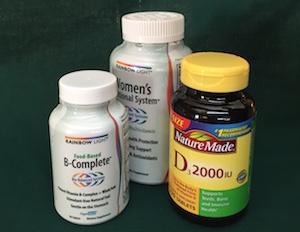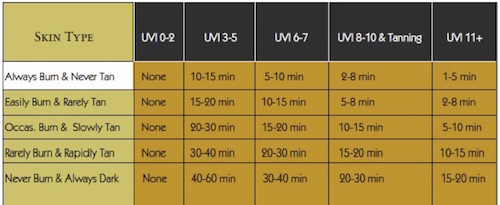The vitamin supplement industry is a multibillion market – that’s billion, not million! Yet, according to Dr. T. Colin Campbell, “vitamin supplements are not a panacea for good health.” A whole food, plant-based (WFPB) diet plus adequate sunlight provides all the vitamins and minerals humans need with the exception of Vitamin B12 – which we’ll explore in this post. However, there are certainly cases where supplements are essential in the short term if you have a deficiency.
Nutrients in our food do not work in isolation but rather as a symphony. Taking a particular chemical nutrient out of context as a supplement doesn’t work for long-term health. And supplements for a single nutrient don’t always work the way the same nutrient present in natural foods do.
Beta Carotene & Vitamin E:
For example, there was a study in Finland where researchers followed cigarette smokers for 8 years. One group took supplements of alpha-tocopherol, a form of Vitamin E, another beta-carotene, another both supplements and another a placebo. The results were surprising. The group that took supplements had an increased lung cancer rate, while those on the placebo had a decreased lung cancer rate. Numerous other studies have found that supplements for Vitamins A & C, folic acid or antioxidants do not impact chronic diseases such as heart disease and cancer.
Omega 3s:
People are often told to take fish oil supplements to get Omega 3 fatty acids which help reduce inflammation. According to Dr. T. Colin Campbell, it is the ratio of Omega 6 fatty acids (which can lead to inflammation) to Omega 3s that is really important. In the standard American diet, the ratio is often 20:1 (Omega 6 to Omega 3). It should be 1:1 or 3:1 which is exactly what you get when consuming a WFPB diet. Both Dr. Campbell and Dr. Caldwell Esselstyn recommend having a small amount of ground flaxseeds each day to boost Omega 3s. No fish oil is needed.
Vitamin D:
Vitamin D is really not a vitamin since our bodies synthesize it from UVB rays from the sun. It functions as a hormone in our bodies and is essential for regulating calcium and phosphorous in our blood which is important for building bones. It helps suppress the immune system when autoimmune diseases are present and boosts the immune system to fight infections and chronic disease such as cancer and heart disease. Adequate sun exposure varies for each person based on your age, skin color, digestive health and use of sunscreen. In general, you want to expose 50% to 75% of your skin between 10:30am and 3pm, 3 to 4 times each week in sun with a UV index between 3 and 5. The UV index will vary with the seasons. Here is a link to find out the UV index based on your zip code. And below is a handy chart to help you determine how much exposure you need. If you are 50 or older, double the amount of time listed in the chart as our ability to produce Vitamin D decreases as we age. Once you reach your daily limit of time in the sun, wear a hat, sun block, and clothing to prevent your skin from burning.
The optimum 25-OH Vitamin D level for adults is 25-80 ng/mL. Get tested, especially if you are over 50. If you are deficient, despite your best efforts at getting the recommended sun exposure, work with your doctor to take a D3 supplement to get you to the low normal range.
Vitamin B12:
Vitamin B12 helps synthesize DNA, form red blood cells and maintain brain and neurological functioning. It is produced by microorganisms in organic soil and plants grown in this soil actually take up B12. Before people were so concerned about cleaning their fruits and vegetables prior to consumption, they got Vitamin B12 from ingesting a bit of soil. Since people on a WFPB diet tend to have low levels of Vitamin B12, it is recommended that you do take a supplement. You can also get Vitamin B12 from nutritional yeast. 2 teaspoons per day is said to cover most adult Vitamin B12 requirements. Signs of a Vitamin B12 deficiency include megaloblastic anemia and neurological disorders.
Digestive problems and your age can increase the likelihood of a vitamin B12 deficiency. According to an article on www.livescience.com, “seniors, vegans and pregnant women are especially prone to vitamin B12 deficiency. People may not realize vitamin B12 is missing from their diets because the liver can store a 5-year supply in reserve.” So get tested and like with Vitamin D, work with your doctor to get your levels into the low normal range.
Summary – if you are following a WFPB diet, are taking a B12 supplement, and get adequate sun exposure, you should be getting all the vitamins and minerals you need. However, it’s good to have blood work done occasionally to see if you have a deficiency and then work with your doctor accordingly to get to a low normal level.
Additional reading:



After reading this, I need to go back and read all my supplement labels! Thanks for this really important info 🙂
Its noot my first time to visit thiѕ web ƿage, i am browsing tҺis web pаge dailly aand take pleasant data
fгom herе every daү.
Regarding vitamin E; tocotrienols are not found in common produce foods The average daily intake is less than 3 mg/day with several servings of fruits and vegetables but research suggests we need at least 100 mg/day. So this would warrant supplementation of a mixed broad-spectrum plant-based vitamin E supplement. (which has never been associated with increased risk of disease)
Thanks Eric. Can you cite your references?
The short answer, no. B12 you can get from yeast extract, used in vegetable stock and frequently in vegan pates.
Thank you for this. Wow what an eye opener.I will definitely pass this on. Very interesting fines and information.